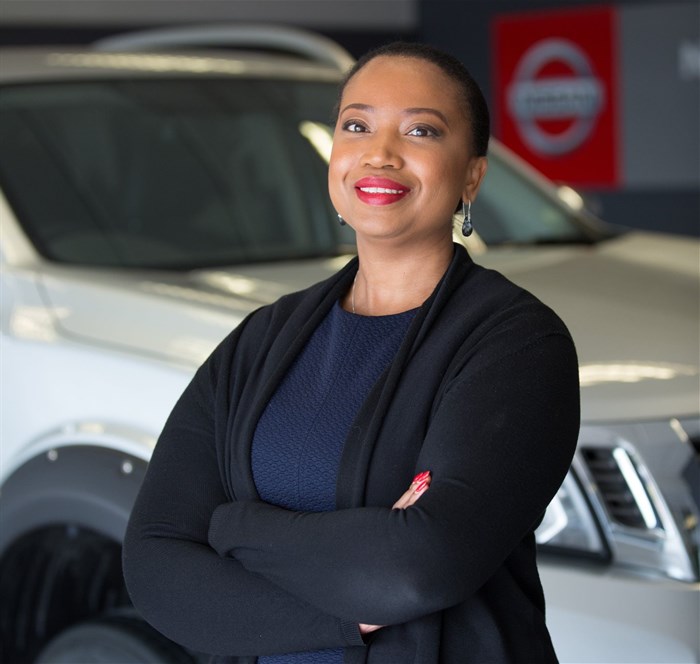Liz Gorbunova is the general manager: chief marketing manager of light commercial (LCVs) and large sport utility vehicles (SUVs) at Nissan South Africa. Gorbunova has almost 16 years of experience in the automotive industry and started her career in Sub-Saharan Africa Jaguar as national sales manager, where after she moved on to become Toyota South Africa's product marketing manager in the passenger vehicle line.

Liz Gorbunova of Nissan South Africa | image supplied
This, coupled with her experience with international markets, as well as her MBA from Gordon Institute of Business, has provided her with a high level of strategic scope and insight within the automotive industry.
Here, Gorbunova reveals more about herself, her career, Nissan South Africa's plans for women empowerment, and more.
Tell us more about yourself and your career path
Gorbunova: I’ve been with Nissan for five and a half years and it feels like only yesterday when I joined the Sub-Saharan Africa team as general manager for sales and aftersales operations. I’ve since moved on to the product marketing team in my current role as general manager: chief marketing manager for the light commercial (LCV) and large sport utility vehicles (SUV). Every day in the role brings with it a host of new and exciting challenges, which is what makes it so fulfilling. I am thrilled to have the opportunity to be part of a team of extremely talented colleagues all working towards bringing new vehicles to the South African and Sub-Saharan Africa markets.
Tell us more about your role at Nissan South Africa
Gorbunova: I’m the chief marketing manager in charge of LCVs and SUVs at Nissan South Africa. Among others, I am also responsible for the commercialisation of the recently launched and locally produced new-generation Nissan Navara.
What future plans does Nissan South Africa have for women empowerment and inclusion?
Gorbunova: At Nissan South Africa, we have set employment equity targets to reach by the year 2025, prioritising the recruitment and empowerment of women at all levels, with a focus on the inclusion of women of colour. These targets include an increase in female representation at top management or and at an executive level to 25%, contributing to and an overall increase overall of female representation at both senior and middle management levels.
The new targets the company has set are simply to ensure an upwards trajectory of the current efforts and achievements by women at Women @ Nissan Diversity and Inclusion Council (#NissanWomen). In recent times, Nissan has seen multiple female senior managers leading some of the most crucial projects for the company.
Some of these projects include the upgrading of the Rosslyn Manufacturing Plant in Pretoria and the building of the Nissan Navara locally, led by senior manager Chantelle Nkosi. Since the opening of the Rosslyn Plant, Nissan has ensured a 50/50 gender split in training programmes, allowing up-and-comers to make it to the top regardless of their gender, orientation or culture. At Nissan, there are equal opportunities for upward mobility.
What challenges have you faced as a female in the automotive industry?
Gorbunova: The day-to-day challenges based on technical ability are no different to those encountered by my male counterparts. When I first joined the automotive industry as a graduate trainee in 2005, the perception of being less knowledgeable than my male colleagues was my most difficult challenge. Fast forward 16 years later, and thankfully some strides have been made towards the support of women in the industry.
Tell us more about Nissan South Africa’s women empowerment journey
Gorbunova: As a global entity, Nissan believes that enabling women, particularly in management positions, is essential to providing diverse value to customers. Our CEO, Makato Uchida, is very proud of the strides that the company has made seen towards an increase in female management globally from 6.7% in 2008 to 13.9% in 2020, owing to its career development support and training provided for women in all regions. Since 2017, Nissan South Africa has spent upwards in excess of R56m in training and development of female employees. In addition to this, Nissan has ensured a 50/50 gender intake for graduate opportunities, ensuring that women are able to access the same opportunities as their male peers.
Further to this, Nissan leaders make a conscious effort to dedicate time to mentorship programmes in the organisation on a formal and informal basis. Sharing our journey inspires young graduates to envision a prosperous future within the industry. Within various teams, we ensure that all parties have an equal voice and know that they are worthy of being heard. As the lead of the Women @ Nissan Diversity and Inclusion Council, I also ensure that the priorities of women at Nissan are tabled and kept top of mind.
To that end, I had the opportunity and privilege of partaking in the Nissan Lead (Leadership Excellence and Development) Programme in 2016, being just one of the many programmes at various management levels offered at Nissan. I have also participated in the Nissan Mentorship Programme with an assigned mentor to assist drive my career growth within the Nissan executive landscape.
What do you think can be done to break down barriers that prevent women from professional development?
Gorbunova: Many women continue to see the automotive industry as male-dominated. To ensure the achievement of the new employment equity, we have identified multiple programmes and activities including:
- Focused talent development and robust succession planning that includes women in strategic positions
- Use of regional programmes like Nissan GTR graduate programme to attract and accelerate the development of females
- Use of programmes like Engineering Career Ladder (ECL) to increase female representation in the engineering fields
- Use of leadership programmes to attract females into technical trades historically reserved for males
What do you think can be done to address the pay disparity issue for women in South Africa?
Gorbunova: My view on remuneration in any industry has always been quite simple, equal pay for equal effort.
Since we are celebrating Women’s Month, what words of encouragement do you have for women?
Gorbunova: Dream big! Young women have the world at their feet. There are many more barriers to break and clichés to disprove. Women should not restrict themselves in terms of what they can or cannot do, because whether they believe that they can, or can’t – they are right.
Ultimately, we as women are equally as competent and as capable as our male counterparts and should never restrict our ambition. If I could close off with one of my favourite quotes from Oprah Winfrey, “The great courageous act that we must all do, is to have the courage to step out of our history and past so that we can live our dreams.”







































